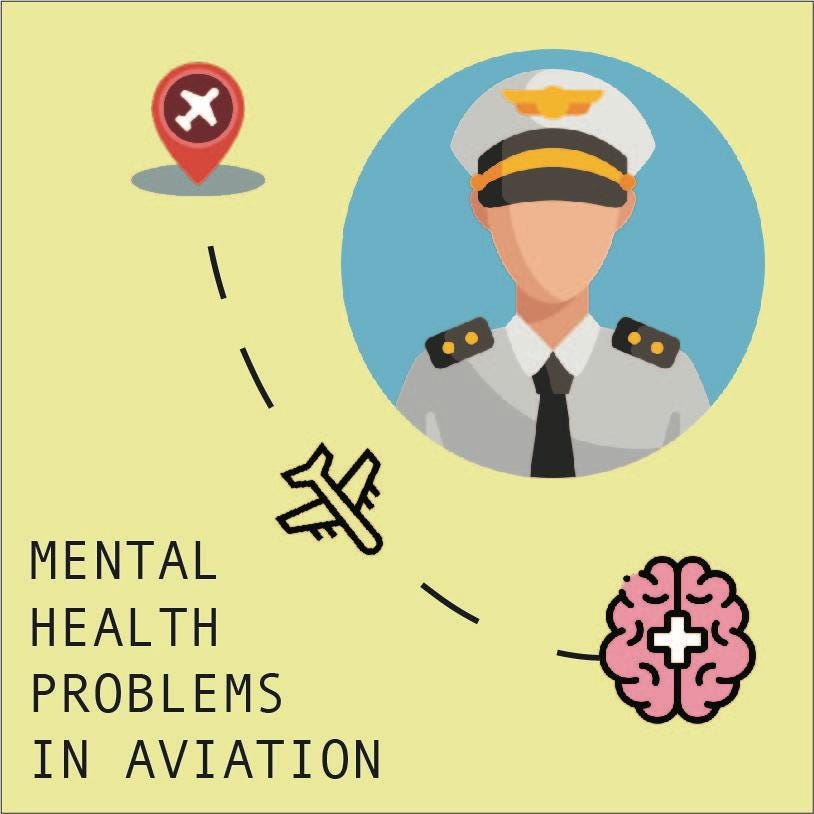Mental health in aviation is a major concern among airlines, regulators, and passengers. This topic gained more attention after the 2015 Germanwings crash, which was deliberately caused by the plane’s copilot. Little data exists on mental health in aviation, but steps to gather relevant information and provide better solutions are underway. The life of an airline pilot can be stressful and demanding. Mental well-being and absence of mental illness are essential to the safe performance of pilot and aviation safety-sensitive duties.
Effects
The magnitude of mental health problems/disorders in aviation is relatively unknown. Mental health is influenced by various personal and occupational factors. Most mental disorders are probably related to depression, anxiety, and alcohol and drug dependence. Being labelled with a “mental health problem” in aviation might have consequences, including stigma and discrimination (perceived and real); grounding; additional costs, including costs associated with examinations and treatment to obtain/maintain medical certification; loss of income; and fear of loss of employment. Possible outcomes of being diagnosed with a mental health problem include self-esteem and self-confidence issues; reluctance to seek help due to medical confidentiality matters; seeking help, but declining treatment; obtaining treatment but failing to disclose the condition or treatment; be hesitant to report concerns to an employer/regulatory authorities; increasing stress and isolation; experiencing adverse effects on the progress of a mental disorder and/or the exacerbation of symptoms. All of these situations can lead to an increased risk to aviation safety, and, in extreme cases, to, Pilot Suicide .
A study of 809 Brazilian pilots found that between 6.7 and 12% had a common mental disorder. For pilots with a heavy workload, this figure increased to 23.7%. Mental health problems are present in aviation, just like in any other industry, and it is important to have a wide variety of tests and screening processes to determine the true wellness of pilots.
Mental illness is second to cardiovascular disease in reasons for losing an aviation license. As a result, many pilots on anti-depressant drugs withhold this information from the governing body of aviation in their country due to fear of losing their license. Detection is further complicated by the fact that few medical examiners fully understand the complexity and effects of the different disorders. Additionally, psychiatrists are unfamiliar with the regulations of pilots suffering from mental health issues. Even though pilots need to have their medical license renewed every 6/12 months by a certified medical examiner, there is little focus on mental health and no psychologist or psychiatrist follows up unless requested to do so by the pilot, which is rarely the case.
Airlines are familiar with the consequences of mental illness, which is why they administer personality tests during the selection process in order to identify any mental health issues. However, because of the stigma in the aviation industry around mental illness, pilots tend to be extremely defensive about their results and may feel pressured to hide any signs of mental health issues.
Causes
During the course of a pilot’s career, the prominence of mental illness becomes an even bigger issue as the stresses of the occupation accumulate. Pilots are exposed to difficult working conditions that feature inconsistent schedules, extended periods away from home, varying circadian rhythm, lack of social support and frequent encounters with fatigue. There is a macho attitude towards mental health in aviation, with a laissez-faire approach. Both males and females in aviation are equally susceptible to mental health issues.[9]
Solutions
The concept of mental health advocacy has been developed to promote the human rights of persons with mental disorders and to reduce the stigma often associated with mental health problems and the resulting discrimination. It consists of actions aimed at changing the major structural and attitudinal barriers to achieving positive mental health outcomes. More recently, the concept of advocacy has been broadened to include the needs and rights of persons with less severe mental disorders and the mental health needs of the general population. Mental health advocacy actions include the following:
- Raising Awareness – Provide information, education and training; develop support networks for information exchange; provide emotional and instrumental support (e.g., providing facilities for meetings and contacts with other groups); provide mental health services (counselling and professional support), promote the formation of alliances of stakeholders for mental health advocacy; and establish implement review boards.
- Prevention – Safeguard the mental health of your workforce by creating an open and caring culture that makes staff feel supported and looked after.
- Culture – Create a culture of openness and awareness by encouraging people to talk about mental health. Develop a mental health policy because having a concrete policy reassures employees that their company cares about their well-being.
Regulators are also considering implementing random psychological screenings to pilots, however it has been suggested that this will not be foolproof in eliminating mental health issues within pilots. ICAO, FAA and EASA have taken positive steps to conduct research into newer and more relevant data concerning mental health within pilots. It is equally important for pilots to feel open about their mental health and not be afraid of losing their career. Airlines have encouraged additional mental health training to there employees to raise awareness as support Pilot Peer Support programs. It should be mentioned that while much of the conversation about mental health in aviation is centered around pilots, this issue extends to other occupations in aviation.
Time to do More
With the need for mental health support clear, experts advise managers and organizations to take positive steps to provide support services. It is important to create a supportive environment for employees so they can feel comfortable to talk about mental health problems.



